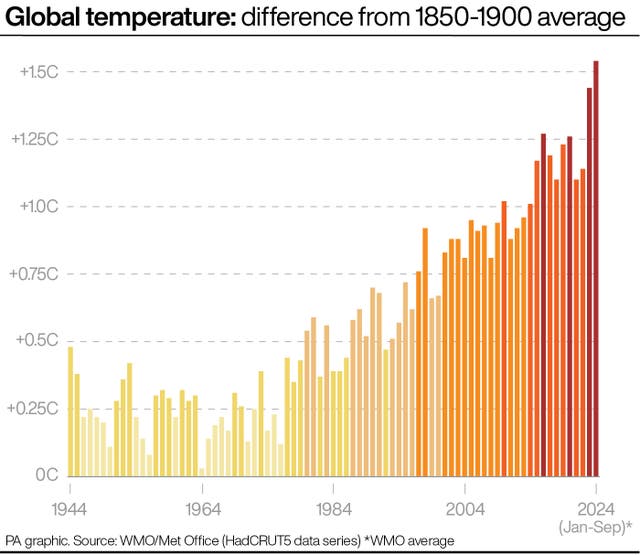2024 set to be hottest year on record as temperatures breach 1.5C threshold
This year is on track to beat 2023’s record heat, the World Meteorological Organisation said.

This year is on track to be the hottest on record, the UN’s World Meteorological Organisation said as it issued a “red alert” over climate change.
The WMO said the global average temperature for January to September 2024 was 1.54C above pre-industrial levels, based on analysis from six global datasets, boosted by a warming El Nino weather phenomenon in the Pacific.
Although this breaches a key threshold of 1.5C above pre-industrial temperatures to which countries have committed to limit global warming to avoid its worst impacts, the WMO said it did not mean the world had failed to meet the goal over the long-term.
Countries are under pressure at the conference to deliver finance for poorer nations to tackle climate change and to increase their actions to meet the goals of the Paris climate treaty to curb global warming to 1.5C or 2C.
And the WMO warns weather and climate extremes from floods and storms to dangerous heat are hitting millions, causing loss of life, damage, worsening food insecurity and exacerbating displacement and migration.
UN secretary general Antonio Guterres said: “Climate catastrophe is hammering health, widening inequalities, harming sustainable development, and rocking the foundations of peace.”
The January to September 2024 global mean surface air temperature was 1.54C above pre-industrial averages, but the WMO said monthly and annual temperatures were affected by natural variability as well as climate change.
The WMO said there was a need to monitor where global warming is relative to the long-term goal in the Paris Agreement, with initial assessments from a team of experts assembled by the agency finding that the world is currently likely to be 1.3C above the 1850-1900 baseline.

“The record-breaking rainfall and flooding, rapidly intensifying tropical cyclones, deadly heat, relentless drought and raging wildfires that we have seen in different parts of the world this year are unfortunately our new reality and a foretaste of our future,” she said.
“We urgently need to reduce greenhouse gas emissions and strengthen our monitoring and understanding of our changing climate,” she warned.
The state of the climate report also shows:
– For 16 consecutive months from June 2023 to September 2024, average global temperatures likely exceeded anything recorded before, and often by a wide margin.
– Greenhouse gases reached record levels in 2023, and data indicates they continued to rise in 2024, with concentrations of carbon dioxide up from around 278 parts per million to 420 in 2023, an increase of 51%.
– Ocean heat was the highest on record in 2023 and preliminary data show 2024 has continued at comparable levels, with ocean warming irreversible over the coming centuries or even millennia.
– Sea level rise is accelerating, going up at a rate of 4.77mm a year from 2014-2023, double the rate between 1993 and 2002.
– Glacier loss is worsening, with the largest melt in 2023 since records began in 1953, due to extreme melting in North America and Europe.





